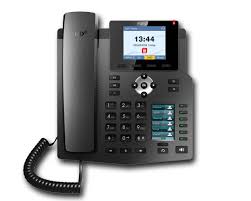What is the difference between PABX and IP PBX

Fanvil X4G 4 Line Enterprise Gigabit IP Phone
January 13, 2023
The history and evolution of PBX
January 15, 2023What is the difference between PABX and IP PBX
PABX and IP PBX are both telephone systems that are used within a private organization, such as a business or government agency, to connect internal telephone extensions to outside public telephone lines and provide communications services such as voice, fax, and voicemail. However, there are some key differences between these two types of systems that organizations should be aware of when choosing which one to implement.
First, the technology that these two systems use is different. PABX systems use traditional PSTN (Public Switched Telephone Network) lines to transmit calls, while IP PBX systems use internet protocol (IP) networks. This means that IP PBX systems are based on software, which makes them easier to scale as new users and numbers can be added to the system. PABX systems, on the other hand, are based on hardware, which means that adding new users or lines requires the purchase of additional hardware.
Another key difference is that IP PBX systems allow users to work remotely by accessing the system through the internet, while PABX systems require users to be physically connected to the PABX. This can be beneficial for organizations with a mobile workforce or employees who work from home. Additionally, IP PBX systems can integrate with other communication and collaboration tools such as instant messaging, video conferencing, and presence information, while PABX systems are typically more limited in their integration capabilities.
In terms of cost, IP PBX systems may be less expensive to set up and maintain over time, as they typically do not require the same level of hardware investment as PABX systems. Additionally, calls made through IP PBX systems are made through the internet (VoIP) which can be cheaper than traditional telephone lines.
Another difference between PABX and IP PBX is the flexibility on call routing, call forwarding and other features. IP PBX systems use VoIP which provides more flexibility, while PABX based on traditional PSTN lines are more limited in the routing options.
Finally, when it comes to maintenance, IP PBX systems are software based so the maintenance is mostly software updates and patches, while PABX systems are hardware-based so the maintenance would be more physical and costly.
In summary, IP PBX offers more flexibility, scalability, cost-effectiveness, and integration possibilities. It can improve communication and collaboration within an organization, and allows for remote working, flexibility, and mobility options. When choosing between PABX and IP PBX, organizations should carefully consider their specific needs and requirements, as well as the long-term costs and benefits of each type of system.



